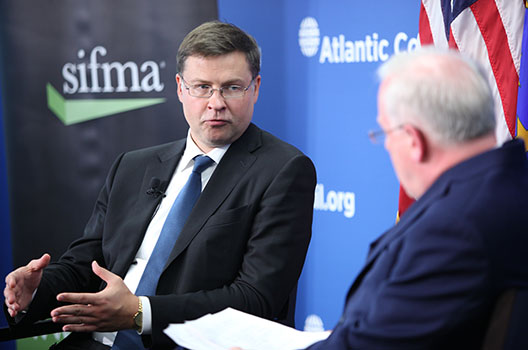 The new British government must quickly begin the process of negotiating the United Kingdom’s exit from the European Union in order to alleviate market uncertainty, according to a top European Commission official.
The new British government must quickly begin the process of negotiating the United Kingdom’s exit from the European Union in order to alleviate market uncertainty, according to a top European Commission official.
“From the European Commission’s viewpoint, we are calling on the British government to come up with a proposal to begin exit negotiations without unnecessary delay,” said Valdis Dombrovskis, European Commissioner for financial stability, financial services and the Capital Markets Union.
“The first steps need to be taken by the UK government, which needs to set up the plan of how to build its future relationship with the EU,” he added.
Dombrovskis spoke at the Atlantic Council in Washington on July 18 at an event jointly hosted by the Council’s EuroGrowth Initiative and the Securities Industry and Financial Markets Association. Following opening remarks, Dombrovskis took part in a discussion with John F.W. Rogers, an executive vice president with Goldman Sachs.
On June 23, the UK voted to leave the EU in a so-called Brexit referendum by a fifty-two to forty-eight percent margin. Immediately following the referendum result, then-Prime Minister David Cameron announced his decision to resign saying that it would be up to his successor to trigger Article 50 of the Lisbon Treaty, which covers the exit of member states from the EU. Theresa May, Cameron’s home secretary, became prime minister on July 14.
Since assuming power, May has appointed David Davis—a prominent proponent of the UK leaving the EU—as the secretary of state for exiting the European Union, a new cabinet position created in the wake of the referendum. Davis will oversee the UK’s withdrawal process. May has said that she will not invoke Article 50 until 2017.
Financial markets took a hit following the Brexit vote: The pound sterling fell to a thirty-one-year low. Markets have since steadily recovered but the UK’s overall economic forecasts remain grim.
“Our preliminary assessments show that uncertainty stemming from the vote will reduce the UK’s GDP by one to two-and-a-half percentage points by 2017,” said Dombrovskis. “The pressure is real.”
“But under the right policies, we will be able to deal with the impact of this [GDP] adjustment. The EU economy has what it takes to cope with downward pressure from the uncertainty that the referendum has created,” he added.
Four freedoms
Despite the British public’s desire to leave the EU, the British government has expressed an interest in remaining in the EU’s single common market—a key provision of the EU that removes barriers of trade between a country and EU member states. In order to participate in the single common market a country must allow the free movement of people, goods, services, and capital across its borders—the so-called four freedoms. Such an arrangement is not unprecedented; Norway is not a member state of the EU but it still has access to the bloc’s single common market.
“We want the UK to remain a close partner…but access to the single market will require the UK to accept the four freedoms: movement of goods, services, capital, and labor. The first step now needs to come from the UK. The new government must set out what it wants in its future relationship with Europe,” said Dombrovskis.
Brexit campaigners pointed to the European migrant crisis—the largest movement of people into Europe since World War II—to strengthen the Leave platform. A country must not hinder the flow of immigrants in order to be considered for EU single common market access.
“The strategic choice that the UK government needs to make is whether it wants the UK to remain a part of the EU internal market or move outside it. We are aware that this is politically complicated [in the UK], but this is the choice that the EU cannot make for the UK,” said Dombrovskis.
The European project
The Brexit result has stirred nationalist sentiment across the Continent—particularly in France, Germany, and the Netherlands. Leaders of far-right political parties in these EU member states have called for membership referenda in their own countries following the UK’s vote. This has put a question mark over European unity.
Dombrovskis noted that such sentiment holds little weight in Brussels: “The remaining twenty-seven member states have shown a commitment to stay united. Europe’s talent for innovation is still there. Our industries are still competitive. Our workers are still productive.”
By no means is the European Commission shrugging off the result of the British referendum and the responsibility of both the EU and the new British government to secure the relationship in the near future.
“For the first time a member state has voted to leave the European Union. That is a challenge that goes to the heart of the European project. Getting the response right will be crucial for Europe’s future,” said Dombrovskis.
Mitch Hulse is an editorial assistant at the Atlantic Council. You can follow him on Twitter @mitchhulse.
Image: From left: Valdis Dombrovskis, European Commissioner for financial stability, financial services and the Capital Markets Union, discusses the economic implications of the British referendum to leave the European Union on the global financial market and European countries with John F.W. Rogers, an executive vice president with Goldman Sachs, at the Atlantic Council in Washington in July 18. (Atlantic Council/Victoria Langton)
